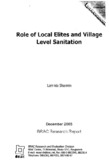| dc.contributor.author | Sharmin, Lammia | |
| dc.date.accessioned | 2019-12-10T03:50:32Z | |
| dc.date.available | 2019-12-10T03:50:32Z | |
| dc.date.issued | 2005-12 | |
| dc.identifier.citation | Sharmin, L. (2005, December). Role of local elites and village level sanitation. Research Reports (2005): Social Studies, Vol – XXXVIII, 427–446. | en_US |
| dc.identifier.uri | http://hdl.handle.net/10361/13236 | |
| dc.description.abstract | This study aimed to explore the role of local elites and associated factors that prevent or
promote sanitation facilities to the poor. The study was conducted in five communities of tive
villages of Nilphamari and Lalmonirhat districts. The three communities - Hazipara,
Korollabechatari and Moulvipara of Jaldhaka/Nilphamari were selected for the role (active,
non-active and newly formed) of Gram Shahayak Committee (GSC -a committee formed by
the CFPR-TUP programme comprised of a group oflocal elites to facilitate the ultra poor). The
other two communities selected were Babupara from Hatibandha and Balatari from Aditmari of
Lalmonirhat district. Babupara was selected as 100 % sanitation community and Balatari as
control community. Data were collected through qualitative approaches during February to
April 2005. The study shows that all the five communities received local elite's support to
some extent. The local elite's support was highest in communities with 100% sanitation and
the active GSC. In different communities the factors were different which prevent the adoption
of total sanitation. The preventing factors were lack of awareness, lack of land, sanitation as
less prioritized issue, and poverty. In these five communities the factors associated with
promoting sanitation are elite perception of disease and disease transmission, concept of ideal
village with proper sanitation, notion of shame, purdah or just soaber kaj. In most cases the
elites were providing help for sanitation through different local institutions. But, it was found
that in most of the villages the local institutions were not being able to provide sanitation
facility to the poor effectively. | en_US |
| dc.language.iso | en | en_US |
| dc.publisher | BRAC Research and Evaluation Division (RED) | en_US |
| dc.subject | Local elites | en_US |
| dc.subject | Sanitation | en_US |
| dc.subject | villages | en_US |
| dc.subject | BRAC | en_US |
| dc.subject | Rural Bangladesh | en_US |
| dc.subject | Rural community | en_US |
| dc.subject.lcsh | Sanitation -- Bangladesh. | |
| dc.subject.lcsh | Sanitation -- Economic aspects. | |
| dc.title | Role of local elites and village level sanitation | en_US |
| dc.type | Research report | en_US |

